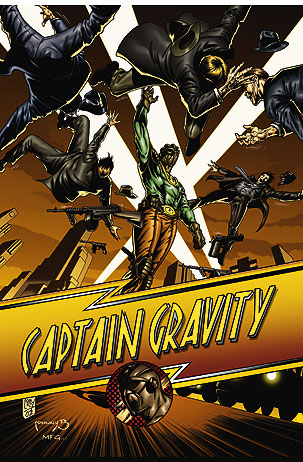If
you look at Penny-Farthing Press' Captain Gravity
and think "cheesy movie serial rip-off, er, homage," you'd
be right. But you'd also be wrong. The concept puts its
origins right out in the open, with Captain Gravity being
the hero of a series of 1930's cliffhangers, all with lurid
titles mysteriously more creative than those of George Lucas.
However, they seem to be loosely based on the real-life
exploits of a hero running around Southern California with
complete control over gravity. In turn, that Captain Gravity
actually got his powers while filming the first Captain
Gravity adventure.
It sounds a little loopy, and Joshua Dysart could have
done a better job explaining what has gone before. Although
Penny-Farthing Press works hard to keep their back issues
available to new readers, nobody buys a new comic wanting
to wait until they get all the backstory straight.
As for the new story in this second mini-series for Captain
Gravity, Dysart spins one of my favorite combinations, Nazis
and mysticism. It worked for Hellboy; it works for
Captain Gravity. This book cleverly mixes high adventure
with a social conscience, and it has a hero doing the right
thing for the right reasons, to boot.
Told in flashback, The Power of the Vril establishes
its premise early, but also sets eerie parallels to modern
day. Not that we have Nazis looking for ancient artifacts
bearing the swastika, or broken cross, but it can be no
accident that the real important news of 1939 gets buried
on page 31 of the newspaper. Hindsight, after all, is twenty
twenty. But with narration from 1962, Dysart juxtaposes
our own time of unease with that of earlier times.
On the eve of the Cuban Missile Crisis, special effects
artist turned amateur scientist Willie Ley gets interviewed
by an obscure science fiction fanzine (shades of the web!)
about a 1947 book, Pseudoscience In Naziland. Clearly,
Ley wrote it after aiding Captain Gravity, which takes us
back to a tale of intrigue, danger and superheroics. All
that, and in a nice nod, Dysart even writes a cameo role
for Ian Fleming, who was a spy for England during World
War II.
Like
many of the Penny-Farthing books, Captain Gravity
has complexity. Steeped in as much historical accuracy as
flights of fancy, it's not a breezy read, but it is fun.
Adventure does come first, but if Dysart makes you think
a little bit about political theory, all the better. The
only thing he simplifies, unfortunately, is writing American
society a little too progressively, to make a sharper condemnation
of Nazism. It's hard to believe that the book's hero, Joshua
Jones, never encounters racism in Hollywood.
The art by Velluto and Almond more than makes up for that
imbalance. It's about time for Velluto to have a resurgence;
he draws cleanly and solidly, without a lot of stylization.
With him, storytelling comes first, and he packs as much
detail into a panel as he possibly can without cluttering
it. Almond's inks are a good complement; he steers Velluto's
work into an individual look.






